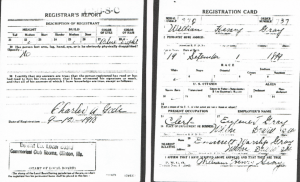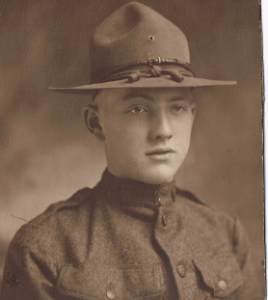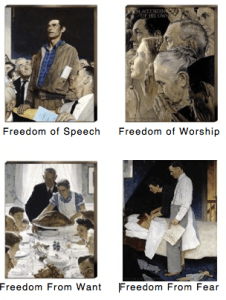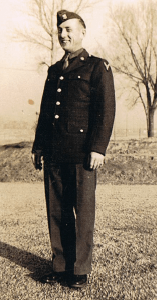A Notable Veteran: William Henry Gray
Every Veterans Day I think about my Uncle Bill Gray — William Henry Gray, to be exact. He was the first veteran I ever knew.
It’s not that Uncle Bill was my favorite uncle to whom I was deeply devoted.
But he did play a role in my life. I recall him playing Pinochle with my family and taking me fishing a couple of times. He also gave me an army belt, some army uniform buttons, and an army hat. And he showed sympathy, as best he could, when my father was killed in a farm accident.
But this year was different. I decided to tell Uncle Bill’s story, which I have never done before.
Not just because the official goal of Veterans Day is “to pay tribute to all American Veterans — living or dead…”
Or because his story is so much more interesting than any other veteran’s story.
Rather, I’m telling his story out of respect for Bill Gray, because his story is notable, and because it may have a message for us on this Veteran’s Day.
Bill Gray and World War I
Bill Gray was born in 1899, in Weldon, Illinois.
When he finished high school, World War I was heating up, and he registered for the draft. (Click on the draft registration cards below to enlarge.)
Without thinking twice, Bill quit his job in Uncle Gene Gray’s dry goods store, passed up an offer to work in a bank, left a fairly serious girlfriend, and enlisted in the Army.
After basic training, he was shipped to Europe, where he fought in the infantry in 1918, during the latter stages of the war. According to my mother (Bill’s sister), Bill fought in France, and later, in Belgium.
He came home after the war, and tried to get his 20-year old life back in order. His girlfriend had died in a flu epidemic while he was gone, and life must have seemed pretty empty.
My mother said that it wasn’t easy for him.
Bill somehow felt lost in society and didn’t feel appreciated. His friends and relatives would simply say that “Bill is generally on the grumpy side.” No one thought much about Post Traumatic Stress Disorder in those days, instead blaming any soldier’s problem on “shell shock” or “battle strain.”
But as years passed, Bill began to feel a little better, and life went on.
Bill Gray and World War II
I was 7 years old when Pearl Harbor was bombed in 1941. Everyone in my broader family was worried when Bill announced that he was going back in the Army, to help, he said, “protect our countries four freedoms.”
When an adult, I asked my mother why he would have said something like that, and she reminded me that Roosevelt had given his famous “Four Freedoms Speech” about 11 months before the Pearl Harbor attack, and Bill had listened to it on the radio.
Roosevelt proposed four fundamental freedoms that people everywhere in the world ought to enjoy: Freedom of Speech, Freedom of Worship, Freedom from Want, and Freedom from Fear. Norman Rockwell was commissioned to paint the pictures.
Once I heard that Bill had mentioned the four freedoms, I framed prints of them, and kept them on my wall. (Click on the prints below to clarify.)
So, on Sept 9, 1942, Bill re-entered the Army to serve in WWII. He was 43 years old, and he was in “for the duration of the war + 6 months”
It was a serious “re-up” if there ever was one, coming 24 years after his first enlistment in WWI. And he left behind a fairly serious girlfriend named Frieda Belle Cackley.
When he returned from the war in 1945, Bill tried to start where he left off. But to the surprise of just about everybody, including Frieda Belle, it did not work out, and they were never married. Two wars had took their toll on Bill’s love life, ruining relationships with perhaps the only two serious girlfriends Bill had ever had.
I tried to get Uncle Bill to talk about his experiences — how he felt about leaving a bank job and a serious girl friend to go to WWI, and leaving a potential wife to go to WWII, and how it felt to come back.
But he simply did not want to talk about it. So I still wondered if he had ever felt thanked, and appreciated.
But, in the spirit of Paul Harvey, there is “a rest of the story.”
The Rest of the Story
In 1994, eight years after Bill Gray died, my wife Harriet and I traveled to Europe with our friends Herm and Evelyn Harding, and stopped off in Belgium to visit the family of our AFS Student, Phillipe Bastenier,
After we’d been there a couple of days, Phillipe’s father, Jacques, decided to have a big party for us, and invited all of his relatives.
As the party progressed, a wizened old man who had been sitting alone in a chair, got up and made his way over to Herm and I. I believe he said his name was Peter.
He placed a hand on each of our arms, and in broken English said “You are the Americans. I want to thank both of you from the bottom of my heart for all the help the American soldiers gave us in the two wars. When the Germans were about to overrun us, the Americans were always there with food and military help. I feel so much gratitude, and have always wanted to thank someone.”
As he explained further and expressed his gratitude again, we all three had tears in our eyes.
When I went to bed that evening, I recalled that Uncle Bill fought in Belgium in WWI, and suddenly it hit me.
Bill Gray, that very evening, was finally getting his thanks, through me, for helping preserve American Freedoms, and for helping preserve Belgium’s freedoms as well!
And somehow, I could see him hearing the Belgium thank you, reacting initially with his war-induced grouchy demeanor, but secretly cherishing the thank you for the rest of eternity.
And now you know the rest of the story!
What We Can Learn From Bill Gray’s Story?
When I think of Uncle Bill’s story, three things come to mind.
First, we live in a country that enjoys freedoms, including the Four Freedoms Bill Gray thought about when he re-entered the Army in World War II. There are people in many nations who would die for these freedoms, and have. The United States of America, warts and all, is a great place to live and a place to cherish and protect.
Second, From the Revolutionary War until today, our veterans, in the spirit of Bill Gray, have sacrificed in many different ways to protect our country’s freedoms. They are men and women, who, to the person, have given a portion of their life, and did what the military asked them to do.
Third, there are 23.2 million veterans in the United States, 9.2 million of whom who are over 65. We need to genuinely thank them for the sacrifices they have made on our behalf, even if the thank you is “a message from Belgium!”
And we need to improve medical services, like those Uncle Bill may have needed and didn’t get, so all can function effectively in society.
President Harry Truman who, like Uncle Bill, fought in the infantry in Europe in WWI, said.
“Our debt to the heroic men and valiant women in the service of our country can never be repaid. They have earned our undying gratitude. America will never forget their sacrifices.”
And this goes for you too, Uncle Bill.






Joseph Sorrentino
Always love my brothers in arms, you should be proud